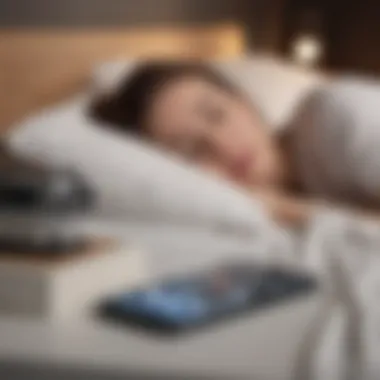Exploring How Anxiety Disrupts Sleep Patterns


Intro
Anxiety is a pervasive challenge that affects numerous individuals around the world. Particularly pertaining to its influence on sleep, this relationship can twist fundamental patterns of rest, creating a cycle of unrest and chemical imbalance. Understanding this dynamic is crucial for those seeking improved mental wellness.
This article investigates the various mechanisms through which anxiety disrupts sleep. It also delves into elaborate explanations on practical strategies that can enhance one's overall well-being, emphasizing attainable solutions for improving sleep quality—that optimistically promotes a more relaxed state of mind.
Sleep disturbances tied to anxiety often range from difficulty falling asleep to frequent awakenings throughout the night.
The results may cascade into a multitude of both physical and cognitive impairments, affecting daily functions and overall quality of life.
Readers will find consolidated insights that relate anxiety's properties to parasomnia and insomnia. Information is seamlessly integrated with insights from behavioral science, outlining the importance of technology and established divergent methods that can combat the consequences of anxiety on sleep.
Understanding Resilience, Well-Being, and Adaptability
- Introduction to the concepts of resilience, well-being, and adaptability
The concepts of resilience, well-being, and adaptability are imperative in traversing life's complexities. Resilience denotes the ability to recover from adversity while emphasizing psychology's positive aspects. Well-being encapsulates general happiness, encompassing both physical and mental domains. Lastly, adaptability implies flexibility in adjusting to established changes, making it rather valuable in today's fast-paced world. - Importance of these factors in personal and organizational development
Equipping oneself with these attributes dramatically enhances personal growth. Using these traits in realms such as organization can boost team morale, productivity, and in turn affect global outcomes positively. Emphasizing mental health and structural support during challenging periods results in improved comprehension of tasks and emotional stability in teams. - Exploring strategies for cultivating resilience and well-being
Thus, actionable methods include encouraging open communication, providing adequate resources for therapeutic engagement, and sustainability initiatives to enhance work-life balance. Such strategies create environments where individuals thrive rather than just survive.
Integration of AI Technology in Coaching
- Overview of AI technology in the coaching industry
AI's introduction into coaching simplifies real-time personal wellness assessments. AI-driven platforms offer insights on behavior trends, allowing individuals and organizations the opportunity to achieve greater alignment with mental health goals. - Benefits of AI-driven coaching solutions for individuals and organizations
AI technologies encapsulate dynamic modeling of user patterns that speaks directly to tailored decision-making—direct could offer improved information accuracy. Its adoption rationalizes and strengthens development pathways while deriving organizational efficiency. - Case studies highlighting successful implementation of AI technology in coaching
For example, companies like BetterUp leverage machine learning capabilities to optimize randomized variables that aid in guidance around workforce cultures available courses. Focused assessments help lead employees toward constructive interaction while further training advances authenticity within industries.
Leveraging Behavioral Science for Personal Growth
- Introduction to key principles of behavioral science
Behavioral science examines how individual behaviors develop within various contexts. Essentially it provides brief background on the vital trigger-points influencing decisions framed in anxiety resolutions. Its insights reside in moving beyond poor mental habits anchored on anxiety. - Practical applications of behavioral science in personal development
Reduced cognitive distortions instigated by never-ending feedback loops inspired by negative motivators severely aggravate anxiety issues. Techniques like cognitive restructuring, mindful meditation, and structuring tasks aid in addressing anxiety incentives; these frequently drive forewarnings of upcoming amplified unease on sleep patterns. - Techniques for enhancing well-being and productivity based on behavioral science
Thus, adopting protocols regarding daily habits is critical for improved mindfulness—to bridge gaps enabling greater organizational efficacy. Brief cognitive-enhancing sessions could support capability-building workshops that react to therapists’ shared techniques for coaching focused outcomes.
Interactive Tools for Self-Improvement
- Overview of interactive tools available on the portal for personal growth
An interactive experience provides proximity for individuals seeking relevant data-driven content inclusive of behavioral therapies. These tools drive understanding with right-sharing rather than volume sharing. - How to effectively utilize these tools to enhance resilience, adaptability, and well-being
Instrumentform reflect individual patterns observed through anxiety tracking without formulaic assumptions guiding user margins conjured despondency; rather reliance emerges enhancing interconnectedness through participatory edges. - User testimonials on the effectiveness of interactive tools in driving change
Testimonies from users highlight the experience better than on-board anticipated benefits. ‘’My manageable improvements are reflective of outcomes noting close engagement assisted with transparency,’’ says Heather, a long-time swon of many practiced apps and methods yielded for cycle changes.
Understanding and applying these behavioral science reflections render invigorating establishments for sleep management.
As we deepen involvement by relishing profoundly pivoted insights illustrated throughout this article, access and employ actionable items—taking attempts towards fairer outcomes. Sleep quality unhinges with guidance gained mapping notable depictions of vigilant spheres reaffirming mental state.
Prelims to Anxiety and Sleep
Understanding anxiety's effects on sleep is crucial for mental health. Many people overlook how deeply anxiety disrupts restful sleep. Sleep and anxiety correlate in complex ways. Anxiety can impede sleep quality, leading to long-term health problems. Addressing these issues can also create pathways for better overall well-being.
Defining Anxiety in Modern Context
Anxiety often appears in various presentations, from generalized anxiety disorder to situational anxiety linked to specific events. In today's fast-paced world, anxiety manifests through chronic worry, restlessness, and harsh feelings. This condition may also have biological roots and can be exacerbated by current societal pressures. For example, the constant influx of information from social media may heighten individual level of distress. Understanding anxiety encompasses recognizing both emotional reactions and coping mechanisms influenced by culture and personal experiences. It also includes identifying triggers that impact one's mental state.
The Importance of Sleep
Sleep affects numerous aspects of life. Quality sleep aids cognitive function, boosts mood, and regulates emotional states. Sleep deprivation can lead to memory issues and diminish decision-making能力. Furthermore, individuals may experience fatigue and difficulty concentrating. In practical terms, cognitive functioning decreases, hindering performance at work or school. Not obtaining enough sleep leads to various problems, creating a cascade of physical and mental consequences. Thus, improving one's sleep becomes pivotal, not just for health, but for enhancing overall quality of life.
"Good sleep is an investment in the energy you need for a productive day ahead."
The Biopsychosocial Model of Anxiety
The Biopsychosocial Model of Anxiety bridges biological, psychological and social dimensions, revealing a comprehensive view of anxiety and its effects. This integrated approach is vital for understanding the complexities of how anxiety disrupts sleep patterns. Recognizing this multi-dimensional interaction provides professionals insight into individualized treatment and better care options. Anxiety should not be seen in isolation; it interrelates with physical well-being, psychological traits, and external social factors.
Biological Factors
Biological perspectives on anxiety explore how genetic predispositions and neurochemical imbalances influence anxiety symptoms. Individuals may inherit a vulnerability to anxiety disorders. Neurotransmitters such as serotonin, dopamine, and gamma-aminobutyric acid play significant roles in regulating mood and sleep. An imbalance can lead to elevated stress levels, creating a cycle that impacts overall sleep quality. Optimal sleep architecture, which includes adequate deep and REM sleep, is crucial for mental health and is often compromised by anxiety-induced hyperarousal.
Psychological Aspects
From the psychological standpoint, thought patterns and cognitive processing contribute crucially to anxiety. Cognitive distortions, like catastrophizing or excessive worrying, amplify feelings of anxiety. These heightened states often make it difficult to relax, falling asleep can become an arduous task. Sleep quality deteriorates as the mind remains burdened with relentless thoughts. Effective acknowledgment of these patterns enables individuals to reframe their perceptions, fostering healthier sleep practices and enhancing cognitive resilience.
Social Influences


Social contexts also impact anxiety management. Relationships provide essential support, yet conflict or lack of connection can escalate feelings of isolation and neglect. External factors like work demands, social expectations, or life changes add layers of stress, exacerbating anxiety. This interplay with social elements highlights the importance of a supportive environment, particularly when combating internal turmoil. Recognizing stressors in personal life assists in developing targeted coping strategies, improving both sleep and overall well-being.
Effective anxiety management requires addressing biological vulnerabilities, psychological stresses, and social dynamics. Each element interacts, shaping an individual’s experience.
By appreciating the role that these factors play, professionals can curate more holistic approaches, tailoring interventions to better serve those struggling with anxiety-related sleep issues.
How Anxiety Affects Sleep Quality
Understanding how anxiety affects sleep quality is crucial. This knowledge provides insights into how emotional health significantly contributes to physical health through sleep. When anxiety levels rise, sleep quality generally declines, leading to a cyclical effect where poor sleep magnifies anxiety. Different factors play into this, including increased heart rates, racing thoughts, and hyper-vigilance. Each of these elements can prevent individuals from getting the restorative sleep needed for optimal functioning, thus impacting daily life activities.
Types of Sleep Disturbances
Insomnia
Insomnia stands out as a central issue related to anxiety and sleep quality. It is characterized by difficulty falling asleep or staying asleep. People suffering from insomnia often find themselves battling both fatigue and lack of concentration. In the context of anxiety, insomnia crystallizes the emotional turmoil, reinforcing feelings of uneasiness. This section will emphasize the psychological aspect — with insomnia, the brain has no chance to recover or reposition during the night.
The unique feature of insomnia is that it can become a standalone condition aside from anxiety disorders. Such distinction raises its profile significantly in this discourse. While insomnia might seem advantageous in some environments requiring immediate attention, it usually creates a negative cycle of fatigue and mood disturbances besides diminishing overall quality of life.
Difficulties in Sleep Onset
Difficulties in sleep onset are a common canyon that anxiety throws people into, where they find themselves trapped in a web of exaggerated thoughts. This aspect emphasizes the need for better strategies that effectively facilitate transitioning into sleep. The hallmark of sleep onset difficulties is the time it takes to fall asleep, which often affects all sleep cycles later in the night.
In this narrative, the prolonged struggle may result in an array of emotional challenges for the individual like irritability and vulnerability. One unique feature of difficulties in sleep onset include the greater propensity for anxiety symptoms to intensify as nighttime approaches. Its identification in this article fosters valuable context on developing sleep-enhancing awareness. Its presence highlights the dual impact—affecting emotional wellbeing on top of interrupting rest.
Frequent Awakenings
Frequent awakenings during the night contribute significantly to the overarching problem of sleep quality in anxious individuals. This specific aspect points to broken sleep cycles that leave individuals feeling unrested and foggy. Frequent awakenings can result in several detrimental effects, including problems in maintaining focus and increased anxiety levels during waking hours. The unique feature here is the consistent disruption of the deep sleep phase, leading to a lack of restorative functions during sleep.
Recognizing the severity of frequent awakenings allows for a deeper understanding of how sleep's disturbance enhances anxiety conditions, often creating an alarming loop of stress-wake cycles. Such awareness may motivate interventions designed to mitigate these symptoms as clarity in capturing the problem areas is fundamental.
Sleep Architecture Disruption
Sleep architecture describes the structure and pattern of sleep cycles that individuals typically undergo. When anxiety intrudes, it warps this natural architecture. Disrupted sleep architecture leads to fragmented sleep, affecting both duration and quality.
Studies suggest that stress hormone levels also fluctuate unpredictably with anxiety. Elevated levels may hinder deep sleep stages, important for mental and physical recovery. Addressing this becomes vital for those grappling with anxiety-related sleep disturbances. Improved knowledge can encourage individuals to seek therapies suited for their sleep needs, convincing them that sleep quality plays a pivotal role in mental health solutions.
Cognitive Behavioral Framework
Cognitive behavioral framework provides un valuable approach in understanding the links between anxiety and sleep patterns. This framework focus on how thought processes related to anxious feelings impact behavior that leads to sleep disturbances. Thoughts, emotions, and behaviors are interconnected, creating a cycle that can be difficult to break. By addressing this cycle through specific techniques, individuals can diminish anxiety and thereby improve sleep quality. Understanding these aspects within the cognitive-behavioral framework allows us to explore effective strategies to combat anxiety’s adverse effects.
Understanding Thought Patterns
To truly grasp how anxiety affects sleep, it is essential to analyze the thinking habits that manifest when anxiety levels rise. Worrying thoughts about daily tasks or potential challenges can fester into anxiety. This ruminative thinking not only leads to heightened anxiety but also fosters an environment unsuitable for restful sleep. In this frame of reference, the individual spends time operating through negative thought loops, often imagining worst outcomes. Such mental preoccupations overshadow the natural winding down process as bedtime approaches.
Strategies for Managing Anxiety
- Mindfulness Techniques
Mindfulness techniques serve to ground individuals in the present moment. This approach minimizes dwelling on anxious thoughts that could impede sleep. Focusing on awareness of one's surroundings brings calmness, facilitating relaxation before bedtime. The distinguishing characteristic of mindfulness practices is their accessibility: they often require no special tools and can be integrated into daily routines. However, a downside is that, for some people, it can take persistent practice to cultivate an effective mindfulness routine that influences sleep fundamentally. - Journaling Practices
Journaling allows those facing anxiety to externalize thoughts and emotions onto paper, creating space in their minds for relaxation. Writing down worries before bed can reduce their power and may facilitate a better understanding of triggers. A key feature is the structure it brings to chaotic thought processes. Journaling can be particularly beneficial as a nightly habit, helping usher in a peaceful mindstate for sleep. Nonetheless, it can sometimes be challenging to confront distressing thoughts through writing, which may deter individuals from maintaining this practice consistently. - Exposure Therapy
Exposure therapy encourages gradual, planned exposure to anxiety-inducing situations or memories. Such techniques diminish the power these elements hold over thoughts and behaviors. By focusing on confronting fears instead of avoiding them, individuals can gradually lessen feelings of anxiety. This approach emphasizes freedom from avoidance, which several research studies suggest leads to improvement in both anxiety and sleep disturbances. One of the unique aspects of exposure therapy is its structured process of facing one’s fears, potentially inducing high levels of discomfort at first. An individual must recognize these feelings and still follow through to see benefits, making it less appealing for some.
Effective management of anxiety through cognitive behavioral strategies can pave the way for better sleep outcomes.
Through understanding thought patterns and implementing various strategies, the cognitive behavioral framework offers a powerful means to tackle anxiety and enhance sleep quality.
Role of Technology in Managing Anxiety
Technology has become an indispensable tool in various domains, including mental health. The intersection of technology and mental health has birthed innovative solutions for managing anxiety and its inherent effects on sleep patterns. Many individuals seek relief through these technological advances. The effectiveness of technology in mitigating anxiety encompasses a variety of methods and tools that engage individuals actively in their mental wellness journeys.
Digital Therapeutics
Digital therapeutics represent a promising development in managing anxiety. They involve software-based interventions designed to treat medical conditions. Unlike mere wellness apps, digital therapeutics often undergo rigorous testing for efficiency and safety. These applications can provide structured programs addressing anxiety through cognitive behavioral methods, often leading to improved mental health outcomes.
For instance, platforms like Woebot and Headspace offer therapeutic interactions that help users recognize and manage anxious thoughts. By utilizing evidence-based practices, users can learn effective coping mechanisms tailored to their individual experiences. Utilizing digital solutions allows enagement with treatment anytime, anywhere.


Advantages of digital therapeutics include:
- Accessibility: Often readily available on smartphones, these therapies fit easily into daily routines.
- Personalization: Programs often adapt to user-inputted data, making the experience more relevant.
- Flexibility: Treatments can vary in duration and intensity based on user preference and need.
However, some consideration is needed to ensure digital therapeutic engagement doesn't turn into dependency on the devices themselves, stressing the importance of learning coping mechanisms that exist beyond screen interfaces.
"Technology should enhance, not replace, personal connection and professional support in dispelling anxiety."
AI-Based Applications
AI-based applications mark another significant advancement worth exploring. These tools leverage the power of artificial intelligence to predict behaviors, analyze user data, and provide customized recommendations to combat anxiety. Many AI solutions offer real-time feedback and engagement for addressing anxiety symptoms as they occur, making the intervention proactive rather than reactive.
For example, applications like Youper use conversational AI to support users through therapy dialogues. By tracking mood variations, these applications enable timely interventions that are crucial for preventing sleep disturbances caused by anxiety. The personalized nature of AI chatbots provides a sense of anonymity that could encourage more user participation.
In a world where transparency about psychological issues can be daunting, AI applications can help facilitate open conversations about mental health.
Key benefits of using AI-based applications include:
- Immediate interaction: Available on demand whenever anxious feelings arise.
- Data tracking: Ongoing assessment of mental states for tailored insights and clinical conversations.
- Empowerment: Users gain tools for managing anxiety independently, boosting their confidence in coping strategies.
Using technology to manage anxiety is a complex but necessary strategy in the modern world. It allows for innovation in self-care, enhancing the impacts of chronic anxiety on sleep health.
Behavioral Science Insights
Behavioral science plays a crucial role in understanding how anxiety impacts sleep. By examining the intricate connections between thought patterns, behavior, and physiological responses, researchers develop effective methodologies to address sleep disturbances related to anxiety.
The studies conducted in the realm of behavioral science primarily focus on understanding the underlying mechanisms that contribute to the stress-anxiety-sleep cycle. Insights obtained from these research endeavors highlight that modifying certain behaviors can lead to significant improvements in sleep quality.
Research Studies on Anxiety and Sleep
A variety of research studies provide compelling evidence of the strong link between anxiety and sleep disruptions.
- One key study published in the Archives of General Psychiatry demonstrates a positive correlation between elevated anxiety levels and the likelihood of insomnia.
- A meta-analysis available on PubMed revisited numerous works, confirming that individuals with generalized anxiety disorder had significantly impaired sleep. This report illustrated that sleep difficulties not only coexist with anxiety but are often exacerbated by it.
- Further analysis reveals that thoughts of worry—especially persisting worries about the future—are strong predictors of sleep latency and overall sleep quality.
These findings underline the importance of addressing anxiety from various therapeutic perspectives in order to potentially restore healthy sleep patterns. Behavioral science researchers advocate tailored interventions aimed at reconditioning thought patterns to facilitate more restful sleep.
Interventions for Improvement
The knowledge gained from behavioral science studies can be translated into practical interventions designed to improve both anxiety levels and sleep quality. These interventions can be summarized in the following approaches:
- Cognitive Behavioral Therapy (CBT): This is widely recognized as an effective method against insomnia and anxiety. CBT focuses on restructuring unhelpful thought patterns that contribute to anxiety, potentially leading to reduced sleep disturbances.
- Relaxation Techniques: Approaches such as guided imagery, progressive muscle relaxation, and breathing exercises encourage a state of calmness, making it easier to fall asleep.
- Behavior Modification: It is important to establish habits that encourage good sleep hygiene, such as maintaining regular sleep schedules, practicing a winddown routine before bedtime, and managing environmental factors — light, noise, and temperature.
Furthermore, integrating mindfulness meditation into one’s daily life can prove beneficial. Various apps like Calm or Headspace provide resources that encourage focused attention, which may, in result, alleviate anxiety and promote better sleep.
In sum, focusing on anxious thought disruption to enhance sleep involves a multi-dimensional approach, prioritizing the application of insights derived from behavioral science research.
Practical Steps to Enhance Sleep
Anxiety can be a significant barrier to getting restful sleep. By incorporating practical steps to improve sleep, individuals can increase the likelihood of achieving quality rest. These steps can also lessen the effects of anxiety on sleep patterns. Focusing on sound practices can help create a connection between improved mental health and better sleep.
Establishing a Sleep Routine
Creating a consistent sleep routine is vital in promoting better sleep. It signals your body when it's time to wind down and prepare for rest. Sticking to fixed sleep and wake times can help regulate your internal clock. This predictability assists in minimizing anxiety that often comes from irregular sleep patterns.
To establish an effective routine, consider the following:
- Set a regular schedule: Aim to go to bed and wake up at the same time every day, even on weekends.
- Limit screens before bedtime: Reduce exposure to blue light emitted by devices such as phones and computers. This can improve melatonin production.
- Relaxation practices: Engage in calming activities before sleeping, like reading a book, practicing gentle yoga, or listening to soothing music.
The benefits of a sleep routine can be considerable. People often find that a consistent routine makes it easier to fall and stay asleep. Consistency can also help manage anxiety levels, providing a sense of stability and control over one's environment.
Creating a Sleep-Friendly Environment


An appropriate sleep environment is crucial for many reasons. It can greatly affect how easy or difficult it is to fall asleep and stay asleep throughout the night.
Consider attention to these factors to transform your sleeping area into a sanctuary:
- Comfortable mattress and pillow: Choose bedding that suits your needs, promoting a comfortable sleeping position.
- Control temperature: Maintain a cool room temperature, which is generally recommended for optimal sleep.
- Minimize noise and light: Use blackout curtains and consider white noise machines to block out distractions that may disrupt sleep.
- Keep the area tidy: A clean environment can instill a sense of calm that may help reduce anxiety.
Creating an environment that underpins quality sleep can support relaxation and ease anxiety. The aim is to cultivate a space that encourages the shift from wakefulness to restful slumber.
By prioritizing these practical steps, individuals can provide themselves the tools to achieve better sleep. This not only aids in alleviating anxiety but also fosters overall well-being.
When to Seek Professional Help
Understanding the appropriate time to seek professional help for anxiety is crucial. Many individuals experience anxiety as a common part of life; however, when anxiety impedes daily functioning or significantly disrupts sleep patterns, it becomes essential to assess the situation and consider professional intervention. Consulting a professional can provide clarity and strategies designed to manage these disturbing symptoms effectively. Furthermore, seeking help may unveil underlying issues contributing to anxiety, allowing for comprehensive treatment that encompasses both physical and emotional health.
Identifying Severity of Anxiety Symptoms
Recognizing specific anxiety symptoms and their severity conditions the decision to pursue professional support. Anxiety can manifest in several ways, such as various thoughts, feelings or behaviors. Pregnant font in experiences of persistent worry, irritability, insomnia, and bodily reactions like excessive sweating or rapid heartbeat significantly impact one’s quality of life.
To categorize the severity of anxiety symptoms, individuals can reflect on the following:
- Frequency: How often do troubling anxiety thoughts occur?
- Intensity: To what degree do these symptoms interfere with daily tasks or routines?
- Duration: Have the symptoms been present more than six months and resistant to self-management?
Overall, a higher frequency, increased intensity, and prolonged duration suggest a more serious consideration for professional help.
Types of Professionals Available
In seeking help for anxiety, various professionals can assist with unique strategies depending on individual needs and symptomatology. Below are the key categories:
Therapists
Therapists primarily focus on emotional and psychological support. They can help patients understand their thought processes, deal with symptoms, and facilitate personal development.
- Key characteristic: They use therapeutic approaches, such as cognitive-behavioral therapy (CBT),to help clients address root causes.
- Benefit: Their guidance assists individuals in achieving greater insight into their condition.
- Unique feature: Therapists also provide consistent sessions over extended periods.
- Advantages and disadvantages: This continuous presence can foster a safe space for addressing emotions, but therapy may require a significant time commitment.
Psychiatrists
Psychiatrists specialize in both the medical management of anxiety and psychological therapy. They assess the specifics of a person’s experience and determine if medication is necessary.
- Key characteristic: They can prescribe medications like SSRIs or benzodiazepines for mood stabilization.
- Benefit: This scope allows for the treatment of anxiety from a dual-blend perspective—mind and body.
- Unique feature: Psychiatrists often collaborate with other healthcare providers for comprehensive care.
- Advantages and disadvantages: Medication can provide rapid relief of symptoms but may also entail side effects, necessitating ongoing communication with the psychiatrist.
Coaching Specialists
Coaching specialists typically focus on practical strategies to manage anxiety, focusing on the individual’s strengths and challenges toward creating a balanced life.
- Key characteristic: They generally emphasize goal setting and personal growth habits.
- Benefit: They can instill motivation and provide actionable frameworks.
- Unique feature: Often, coaching offers more flexible, less intensive support sessions than therapy.
- Advantages and disadvantages: While coaching could support daily tools and constructive mindset shifts, it may lack the deep psychological approach available from therapists and psychiatrists.
Understanding these options equips individuals to make informed choices about the nature of the help they require and when it is appropriate to pursue such resources for their mental wellness.
Finale
Understanding the relationship between anxiety and sleep is crucial for improving quality of life. Anxiety, when left unaddressed, often leads to various sleep disturbances. People who experience anxiety may find issues such as insomnia, restless nights, or problems with sleep regularity increasingly common. This article has revealed ways anxiety manifests in daily life and consequently affects sleep quality.
Summary of Key Points
The significant points raised in this article include:
- The connection between anxiety and sleep patterns, emphasizing how anxiety increases the likelihood of sleep disturbances.
- Understanding various types of sleep disturbances linked to anxiety, including insomnia, difficulties in sleep onset, and frequent awakenings.
- Highlighting the role of cognitive-behavioral strategies for both managing anxiety and enhancing sleep quality, with practical techniques provided.
- Potential interventions from technology such as AI apps and digital therapeutics that support anxiety management.
- When to seek professional assistance and the types of specialists who can effectively address these challenges.
Each of these key points contributes to a layered understanding of why sleep is affected by anxiety and what can be done to mitigate these effects.
Future Directions in Research and Therapy
The realm of anxiety and sleep research is continually evolving. Several avenues could potentially lead to advancements in treatment and understanding:
- Interdisciplinary Collaboration: Further studies that involve psychologists, sleep specialists, and technologists working together could generate more effective therapies.
- Longitudinal Studies: Conducting comprehensive long-term studies can provide deeper insights into how anxiety's impact on sleep evolves over time and what demographic factors are at play.
- Technological Innovations: As AI technology progresses, newer and more personalized applications for combating anxiety may offer support tailored to individual sleep needs.
- Holistic Approaches: Increasing interest in alternative therapies, such as mindfulness and yoga, are other potential avenues worth exploring. More detailed investigation is needed to understand how these methods integrate with standard practices.
Examining these avenues might hold great promise for enhancing both our approaches to therapy and the very understanding of how anxiety relates to sleep disturbances.



